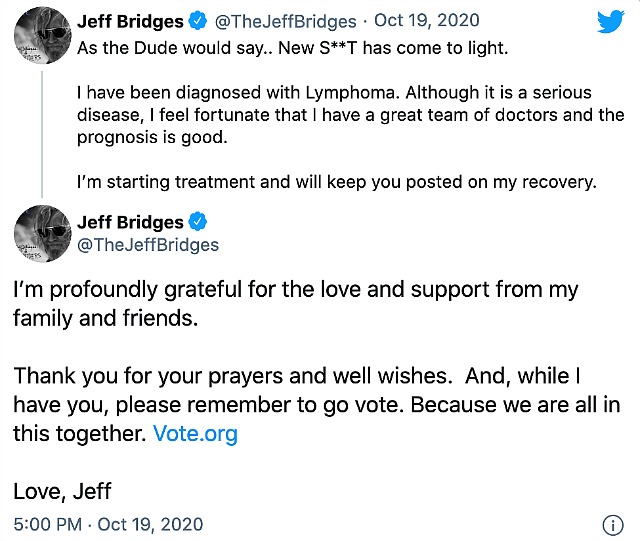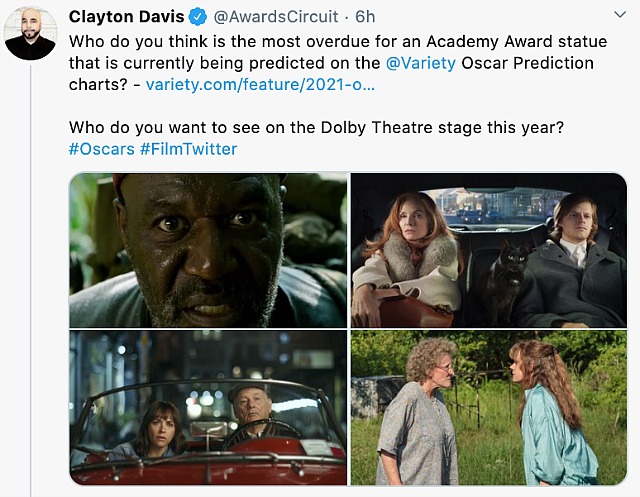But with some experience and seasoning…


But with some experience and seasoning…


…and perhaps may even be cured.
The treatment for Hodgkin lymphoma is highly effective. The five-year survival rate for dudes with Hodgkin lymphoma is 87%. If the cancer is found in its earliest stages, the five-year survival rate is 92%. If the cancer spreads regionally, the five-year survival rate is 94%. If the cancer has spread to different parts of the body, the five-year survival rate is 78%.
Non-Hodgkin lymphoma may arise in lymph nodes anywhere in the body. Hodgkin lymphoma typically begins in the upper body, such as the neck, chest or armpits. Hodgkin lymphoma is often diagnosed at an early stage and is therefore considered one of the most treatable cancers.

…with her pet cats. Which I’m happy to hear.
Delroy Lindo, Bill Murray, Glenn Close and Michelle Pfeiffer are all overdue for Oscar recognition. This year they’ve all hit the jackpot in Da 5 Bloods, On The Rocks, Hillbilly Elegy and French Exit, respectively. I’d rather not say who’s the most deserving in this regard. Okay, it’s Close — she’s been nominated six or seven times over the last 40 years. Lindo’s performance as a Trump-supporting Vietnam veteran is fairly locked in. Murray’s performance represents 85% to 90% of On The Rock‘s allure, but I’m not sure it’s on the level of his historic turns in Rushmore and Mad Dog and Glory. Pfeiffer’s 40 years in the business could in themselves validate her “due”-ness. Close, Murray, Lindo and Pfeiffer — that’s my lineup.

From Pauline Kael’s “The Man From Dream City,” published in The New Yorker on 7.7.75. “Nearly all of Cary Grant’s seventy-two films have a certain amount of class and are well above the Hollywood average, but most of them, when you come right down to it, are not really very good.
“Grant could glide through a picture in a way that leaves one indifferent, as in the role of a quaint guardian angel named Dudley in the bland, musty Goldwyn production The Bishop’s Wife (1947), and he could be the standard put-upon male of burbling comedy, as in Every Girl Should Be Married (1948) and the pitifully punk Room for One More (1952) — the nice-nice pictures he made with Betsy Drake, who in 1949 became his third wife.
“[And] he could be fairly persuasive in astute, reflective parts, as in the Richard Brooks thriller Crisis (1950), in which he plays a brain surgeon forced to operate on a Latin-American dictator (José Ferrer). He’s a seasoned performer here, though his energy level isn’t as high as in the true Grant roles and he’s a little cold, staring absently when he means to indicate serious thought. What’s missing is probably that his own sense of humor isn’t allowed to come through; generally when he isn’t playing a man who laughs easily he isn’t all there.
“No doubt Grant was big enough at the box-office to have kept going indefinitely, surviving fables about caterpillars, and even such mournful mistakes as hauling a cannon through the Napoleonic period of The Pride and the Passion.
“But if Alfred Hitchcock, who had worked with him earlier on Suspicion, hadn’t rescued him with Notorious, in 1946, and again, in 1955, with To Catch a Thief (a flimsy script but with a show-off role for him) and in 1959 with North by Northwest, and if Grant hadn’t appeared in the Stanley Donen film Charade in 1963, his development as an actor would have essentially been over in 1940, when he was only thirty-six.
“In all four of those romantic suspense comedies, Grant played the glamorous, worldly figure that ‘Cary Grant’ had come to mean: he was cast as Cary Grant, and he gave a performance as Cary Grant. It was his one creation, and it had become the only role for him to play — the only role, finally, he could play.
“The special charm of Notorious, of the piffle To Catch a Thief, and of North by Northwest and Charade is that they give him his due. He is, after all, an immortal — an ideal of sophistication forever. He spins high in the sky, like Fred Astaire and Ginger Rogers. He may not be able to do much, but what he can do no one else has ever done so well, and because of his civilized non-aggressiveness and his witty acceptance of his own foolishness we see ourselves idealized in him. He’s self-aware in a charming, non-egotistic way that appeals to the very people we’d want to appeal to.”
Am I allowed to say that one of the first things I noticed about Viola Davis‘s Ma Rainey is her liberal application of rouge? And that she could do with a bit less?
Boilerplate: “Tensions and temperatures rise over the course of an afternoon recording session in 1920s Chicago as a band of musicians await the trailblazing Ma Rainey — legendary ‘Mother of the Blues.’ Late to the session, the fearless, fiery Ma engages in a battle of wills with her white manager and producer over control of her music. As the band waits in the studio’s claustrophobic rehearsal room, ambitious trumpeter Levee (Chadwick Boseman) — who has an eye for Ma’s girlfriend and is determined to stake his own claim on the music industry — spurs his fellow musicians into an eruption of stories, truths, and lies that will forever change the course of their lives.”
Gertrude “Ma” Rainey (born Gertrude Pridgett, 4.26.86 – 12.22.39) “was one of the earliest African-American professional blues singers and one of the first generation of blues singers to record. Known for her powerful vocals, energetic disposition, majestic phrasing and a moaning style of singing — qualities most evident in her early recordings ‘Bo-Weevil Blues’ and ‘Moonshine Blues’.”
“Rainey recorded with Thomas Dorsey and Louis Armstrong, and she toured and recorded with the Georgia Jazz Band. She toured until 1935, when she largely retired from performing and continued as a theater impresario in her hometown of Columbus, Georgia until her death at age 53.”
Donald Trump during reported conference call with campaign staff from his namesake hotel in Las Vegas: “People are tired of Covid. I have these huge rallies. People are saying whatever. Just leave us alone. They’re tired of it. People are tired of hearing Fauci and all these idiots. Fauci is a nice guy [but] he’s been here for 500 years. Fauci is a disaster. If I’d listened to him, we would have had 500,000 deaths.”
Trump was throwing around the same “people have had enough” and “free the states” crap back in April-May-June, and this attitude is what led to much more infection and basically where we are right now. If people had hung tough last spring and early summer and behaved like the population of West Hollywood does as a rule, and if there hadn’t been so much anti-masker sentiment among the Karens and belligerent red-hats and if there hadn’t been so many super-spreader events like the recent motorcycle rally in Sturgis, South Dakota…if more people had worn masks, washed their hands and behaved like reasonable adults, the country would be in a less infected place right now.
For decades and decades there used to be this thing, this standard, this kind of widely admired, grade-A movie that was more or less regarded as extra-good on its own carefully constructed, well-ordered, just-right terms.
The charm was mostly in the craft and rigor and style of it, and rarely about what it was saying. That’s not to say that each and every significant film since the 1920s didn’t “say” something, or that the things that were said time and again (sometimes overtly, more often in the subtext) were entirely admirable. They often weren’t, but good movies were mostly about the way they played to a relatively accommodating paying crowd. They were about being smart, clever, confident and assured….about having their act figured out and thought through to the bottom, which often resulted in a more-or-less harmonious whole.
Right here and right now, this kind of approach to first-rate filmmaking — that kind of finely-tuned, craft-based methodology a la Manchester By The Sea, Call Me By Your Name, 12 Years A Slave, The Social Network, A Separation, Zero Dark Thirty, The Irishman, Lady Bird, Son of Saul, The Wolf of Wall Street, Leviathan, Joker, The Square, Moneyball, The Lighthouse, Dunkirk — that kind of filmmaking has been…well, not “forgotten” exactly but sorta kinda put aside for the time being. Right here and right now, films are mainly being made and judged according to who’s in them, who made them and whether or not the right boxes have been checked.
And guess what? If you say in so many words that the afore-mentioned seems to be happening, you’re a bad person who needs to be cancelled.
Critics are totally playing along with this, of course. Because they don’t want to be replaced.
This is the ideological garrison state within which we all currently reside. What a film is “saying” is all. Craft levels are appreciated, respected…but if they’re only so-so in this or that film, no one is going to get overly bent out of shape. Because ideology and social reflection are what matter. Say it correctly and assemble the package with the right collaborators, and you’re more than halfway home.